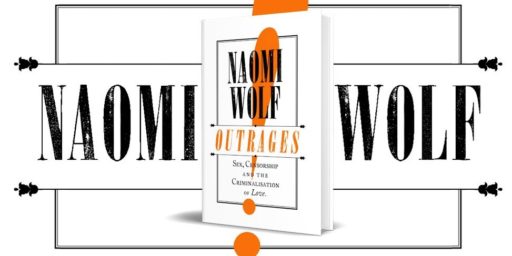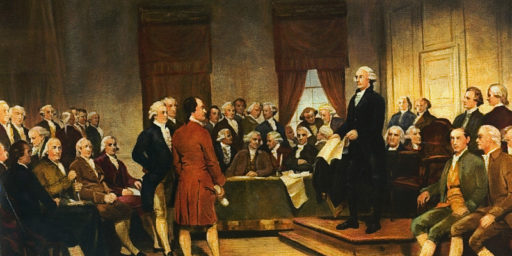House Leaves Patriot Act As Is
AP – Bush Wins; House Leaves Patriot Act As Is
The Republican-led House bowed to a White House veto threat Thursday and stood by the USA Patriot Act, defeating an effort to block the part of the anti-terrorism law that helps the government investigate people’s reading habits. The effort to defy Bush and bridle the law’s powers lost by 210-210, with a majority needed to prevail. The amendment appeared on its way to victory as the roll call’s normal 15-minute time limit expired, but GOP leaders kept the vote open for 23 more minutes as they persuaded about 10 Republicans who initially supported the provision to change their votes.
“Shame, shame, shame,” Democrats chanted as the minutes passed and votes were switched. The tactic was reminiscent of last year’s House passage of the Medicare overhaul measure, when GOP leaders held the vote open for an extra three hours until they got the votes they needed. “You win some, and some get stolen,” Rep. C.L. Butch Otter, R-Idaho, a sponsor of the defeated provision and one of Congress’ more conservative members, told a reporter.
Rep. Zach Wamp, R-Tenn., said he switched his initial “yes” vote to “no” after being shown Justice Department documents asserting that terrorists have communicated over the Internet via public library computers. “This new world we live in is going to force us to have some constraints,” Wamp said.
The effort to curb the Patriot Act was pushed by a coalition of Democrats and conservative Republicans. But they fell short in a showdown that came just four months before an election in which the conduct of the fight against terrorism will be on the political agenda. Besides successfully fending off the effort to weaken the law, the veto threat underscored the administration’s determination to strike an aggressive stance on law enforcement and terrorism.
***
Supporters of the law said the Patriot Act has been a valuable tool in anti-terror efforts. The law, enacted in the weeks after the Sept. 11, 2001, attacks, gave the government stronger powers to conduct investigations and detain people. “I would say, in my judgment, that lives have been saved, terrorists have been disrupted, and our country is safer” because of the act, said Rep. Porter Goss, R-Fla., chairman of the House Intelligence Committee and a man President Bush is considering to be the next director of the Central Intelligence Agency.
Otter and Rep. Bernard Sanders, I-Vt., led the effort to block one section of the law that lets authorities get special court orders requiring book dealers, libraries and others to surrender records such as purchases and Internet sites visited on a library computer. They contended the provision undermines civil liberties and threatens to let the government snoop into the reading habits of innocent Americans. “We are all in that together,” Sanders, one of Congress’ most liberal lawmakers, said of the anti-terror effort. “In the fight against terrorism, we’ve got to keep our eyes on two prizes: the terrorists and the United States Constitution.”
***
Rep. Frank Wolf, R-Va., read a letter from the Justice Department stating that “as recently as this past winter and spring, a member of a terrorist group closely affiliated with al-Qaida” had used Internet services at a public library. The letter mentioned no specifics, Wolf said. “If we can stop what took place in my area,” said Wolf, whose district is near the Pentagon, a Sept. 11 target, “then I want to stop that, because we’ve gone to enough funerals.”
Critics of the Patriot Act argued that even without it, investigators can get book store and other records simply by obtaining subpoenas or search warrants. Those traditional investigative tools are harder to get from grand juries or courts than orders issued under the Patriot Act, which do not require authorities to show probable cause. “We don’t want tyranny,” said Rep. Jerrold Nadler, D-N.Y.
According to a list read by a House clerk, lawmakers switching their votes from “yes” to “no” included GOP Reps. Michael Bilirakis of Florida, Rob Bishop of Utah, Tom Davis of Virginia, Jack Kingston of Georgia, Marilyn Musgrave of Colorado, Nick Smith of Michigan, Thomas Tancredo of Colorado, and Wamp. Some Democrats switched from “no” to “yes,” including Robert Bud Cramer of Alabama, Rodney Alexander of Louisiana, and Brad Sherman of California.
While the House, unlike the Senate, traditionally uses hardball tactics to ram bills through that the majority party supports, changing the rules after the fact seems beyond the pale–although I don’t know precisely what the Rules Committee had stipulated.
Zach Wamp was briefly my Congressman (I lived in Chattanooga for 18 months during his Freshman term) and Frank Wolf is my current Congressman; both are quite conservative and their votes don’t surprise me. I’m a bit surprised that Bud Cramer, whose voting record is also quite conservative, was persuaded to vote the other way–it’ll hurt him in Alabama, although he may be sufficiently entrenched as to be bulletproof.
Substantively, I find it hard to get worked up about the specific Patriot Act provisions in dispute here. While I find the declaring of American citizens as “enemy combatants” unconscionable, that’s not at stake here. Giving Federal agents the ability to look at Internet records and whatnot with judicial authority under “reasonable suspicion” rather than “probable cause” doesn’t both me. Those things aren’t particularly intrusive and we already use the lower standard for such things as vehicular searches–which strikes me as much more problematic than looking at library records.






I agree; there are worse things than having the government peeking at what we read. But I do have concerns that it can easily be perverted into something worse. “After extensive analysis, we find that people who [`use drugs illegally’|`suffer from depression’|’use Unix’] tend to read [list of books], so to [`protect our children’|`fight the war on drugs’|`help Microsoft’] we’re starting a major effort to look for these patterns on a preemptive basis.”
One major difference I see between searching cars and analyzing reading habits is the amount of knowledge they will eventually decide they can derive from the latter. A car search is pretty specific–you’re looking for “contraband”, whatever that may be. (Although the amount of trash in someone’s car may tell us something…)
Looking at reading habits is a somewhat vague hope of deciding if someone is a crazed weasel terrorist Unibomber clone, manic-depressive, psychotic, whatever. It’s not a specific search but a stab in the dark, as presumably we (currently) don’t have specific prohibited books, unlike prohibited drugs or weapons.
It also seems inevitable that the rights of minors to any sort of privacy with regard to what books they buy/read will be sacrificed. While in many cases this may not be a bad thing, some parents will abuse this. “Aha! You’ve been reading that atheist tripe by James Randi! Off to the Christian brainwash camp with you!”
On the other foot, I can almost convince myself that lists of books people check out from the public library should be made public knowledge. After all, a taxpayer-supported library is, indeed, supported by taxpayers–so why shouldn’t they know what books people are reading, if they really feel a need for this?
Finally, I don’t feel a need to pay for computer access in libraries so people can secretly download pr0n (or whatever). I don’t personally care if they download pr0n, but I also don’t see any reason not to make it public knowledge.
1) Where does it say that the gummint may (or is obligated to) share its findings with the parent of a minor? I don’t think such a thing is the function of the state, but I don’t really think they are doing this. Am I wrong?
2) This type of thing isn’t as problematic as it sounds, as the person who is truly committed to privacy can still go to a bookstore and pay cash for The Anarchist’s Cookbook or whatever it is they want to read. I also imagine that a few books here and there are assumed to be curiosity/research, and there’s a huge “critical mass” of Paladin/whatever titles one needs to draw Federal attention. Also, the juiciest titles are available at gun shows. Again–cash.
I think this type of action is more about *not* making things easy for terrorists, rather than getting into the details of what average citizens are doing; I suspect they don’t care about that.